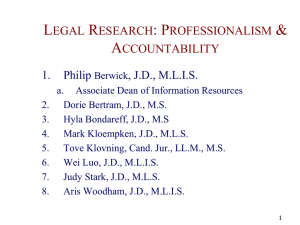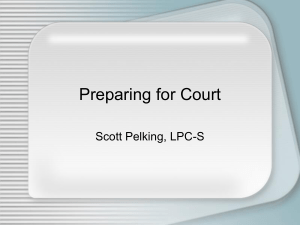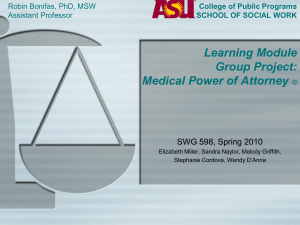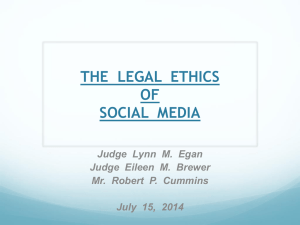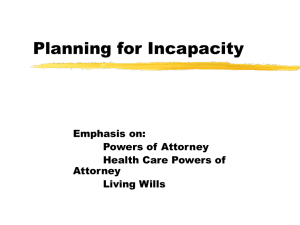1-11-14UFEmploymentLecture
advertisement
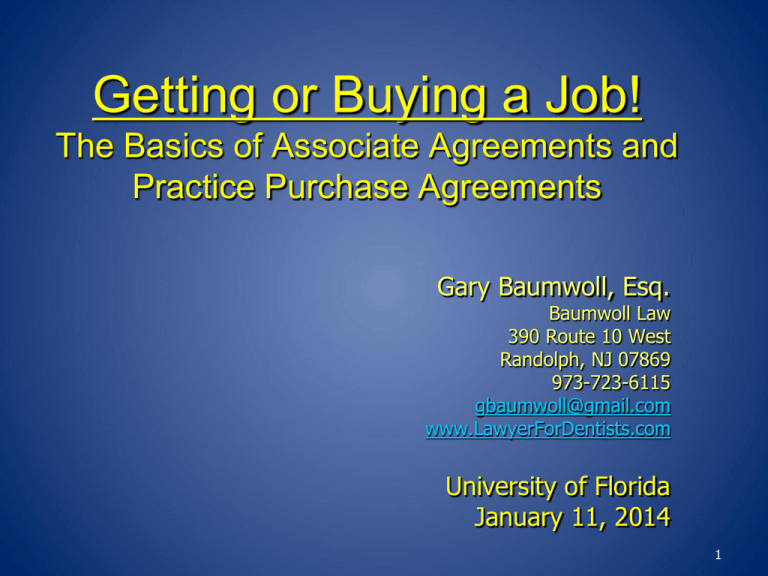
Getting or Buying a Job! The Basics of Associate Agreements and Practice Purchase Agreements Gary Baumwoll, Esq. Baumwoll Law 390 Route 10 West Randolph, NJ 07869 973-723-6115 gbaumwoll@gmail.com www.LawyerForDentists.com University of Florida January 11, 2014 1 About Me Princeton University, A.B., 2002 Rutgers School of Law, J.D., 2007 Attorney specializing in legal issues in the practice of dentistry, including practice transitions, employment contracts, partnership agreements, leasing issues Understanding Employment Contracts and Purchasing a Practice This presentation is designed to highlight some of the legal issues in employment and purchase contracts. We will explore the issues from the perspective of both the employer and employee and the owner and purchaser. 3 Why Hire an Associate? Excessive patient load Desire to reduce workload Transition imminent Why NOT to Hire an Associate Professional companionship Expectation of growth Desire to keep all procedures “in house” Locked-in buyer Better utilization of overhead Employing an Associate When hiring or becoming an associate, a written employment agreement is strongly suggested. If a post-association transition is planned, the agreement should address the basic terms. Elements of an Employment Agreement services and duties term and termination compensation employee expenses days off Representations malpractice insurance restrictive covenants ownership potential legal remedies Services and Duties of Employee hours and days call schedule administrative duties professional and promotional activities study groups outside employment Term of Agreement length of employment (usually one year) employment at will renewal status self-renewing self-extinguishing Termination of Agreement death disability, full/partial for cause without cause at discretion of employer Compensation of Employee salary vs. hourly vs. per diem bonus system percent of production or collection percent vs. base per diem pension, health, fringe benefits auto call schedule promotional activities Employee Expenses Auto (?) cell phone continuing education practice promotion professional association dues Malpractice Insurance occurrence vs. claims made tail coverage prorated premium for part-time work same carrier as employer if possible Restrictive Covenants access to and return of confidential information (patient list) non-compete clause non-solicitation clause reasonable time and distance Restrictive Covenants Damages actual liquidated Remedies injunction financial payment Ownership Interest or Potential No interest or potential for any interest “sweat” equity gradual buy-in Boilerplate Provisions notice governing Law assignment entire agreement headings severability third-party beneficiaries pronouns Independent Contractor vs. Employee The IRS Rule: The Owner has the right to control or direct only the result of the work done by an independent contractor, and the not the means and methods of accomplishing the result. Independent Contractor vs. Employee Taxes without current payroll tax cut Independent Contractor: Worker has to pay the matching payroll tax = 7.5% Employee: Owner has to pay the matching payroll tax = 7.5% Independent Contractor vs. Employee When in doubt… The Worker = Employee Types of Dental Practice Transitions 100% Purchase of Practice With or without prior associations with the practice Partial Buy-In of Practice With or Without prior associations with the Practice Documents for 100% Purchase of Dental Practice Asset Purchase Agreement Bill of Sale Lease Employment Agreement Corporate Formation Documents for Partial Buy-In Purchase of Dental Practice Asset Purchase Agreement Bill of Sale Operating Agreement Lease Employment Agreements Loan Documents Corporate Formation Some Important Dental Issues to be Addressed by an Attorney Seller’s warranties Assets being sold/Allocation Prepaid Accounts/Fee Schedule Accounts receivable Lease Indemnification Adjustments Closing contingencies Seller’s Warranties Practice is in compliance with all laws, rules and regulations There will be at least 30 days worth of supplies in the office on the Closing Date All equipment and fixture are in good working order on the Closing Date Asset Being Sold/Allocation Furniture, Fixture and Equipment Supplies and Inventory Good for Purchaser – Very bad for Seller Goodwill Good for Purchaser – Very bad for Seller Bad for Purchaser – Very Good for Seller Restrictive Covenant Bad for Purchaser – Very bad for Seller Prepaid Accounts/Fee Schedule Crowns, Bridge and Prosthetics Preparation 25% Impression 25% Try-in 25% Insertion 25% Orthodontic Prepaids are very important numbers to know. Accounts Receivable Accounts receivable are the fees owed to the Seller for work completed before Closing Seller usually keeps accounts receivable Accounts receivable can be offset by prepaids An average amount is 60 to 90 days of collection HUDSON CAREER COUNSELING How to Choose and Work with an Attorney Choosing an Attorney Attorney is your advocate and can represent only you. Probe for possible conflicts of interest. Attorney can be hired by both parties to mediate and draft a mutually-agreeable contract, but . . . Each party must then hire a personal attorney to review contracts. Attorney must . . . be familiar with dental practice employment issues be knowledgeable about dental issues have excellent references Working with an Attorney Do your homework--be prepared Plan early Be your own best advocate Be reasonable Be the client you would want as a patient Avoid false economies Pay your bill Working with an Attorney: Your attorney is your ally but not your friend. You have a business relationship. You are are paying for attorney’s time. Each phone call costs you money. Stay on point (make small talk off-the-clock). Even a “busted” deal costs you money. There is no such thing as a “quick peek.” Working with an Attorney: Legal Costs Written agreement outlining fees: initial retainer (refundable if unearned) hourly: $300 - $425/hr flat fee: $1,000 - $1,500 Terminating the Attorney/Client Relationship successful completion of transaction unsuccessful transition conflict with attorney Disclaimer This information is not intended as a substitute for legal advice. You should familiarize yourself with the laws of your local jurisdiction and seek legal advice from a local attorney who specializes in such matters. If you have a question or need a copy of the handout contact me at: Gary Baumwoll, Esq. 390 Route 10 West Randolph, NJ 07869 973-723-6115 gbaumwoll@gmail.com www.LawyerForDentists.com Get a Job! Gary Baumwoll, Esq. gbaumwoll@gmail.com www.LawyerForDentists.com 39

